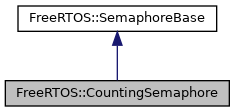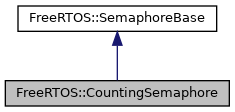Class that encapsulates the functionality of a FreeRTOS counting semaphore. More...
#include <FreeRTOS/Semaphore.hpp>


Public Member Functions | |
| CountingSemaphore (const UBaseType_t maxCount, const UBaseType_t initialCount=0) | |
Construct a new CountingSemaphore by calling SemaphoreHandle_t xSemaphoreCreateCounting( UBaseType_t uxMaxCount, UBaseType_t uxInitialCount) More... | |
| CountingSemaphore (const CountingSemaphore &)=delete | |
| CountingSemaphore & | operator= (const CountingSemaphore &)=delete |
| CountingSemaphore (CountingSemaphore &&) noexcept=default | |
| CountingSemaphore & | operator= (CountingSemaphore &&) noexcept=default |
 Public Member Functions inherited from FreeRTOS::SemaphoreBase Public Member Functions inherited from FreeRTOS::SemaphoreBase | |
| SemaphoreBase (const SemaphoreBase &)=delete | |
| SemaphoreBase & | operator= (const SemaphoreBase &)=delete |
| bool | isValid () const |
| Function that checks if the underlying semaphore handle is not NULL. This should be used to ensure a semaphore has been created correctly. More... | |
| UBaseType_t | getCount () const |
Function that calls UBaseType_t uxSemaphoreGetCount( SemaphoreHandle_t xSemaphore ) More... | |
| bool | take (const TickType_t ticksToWait=portMAX_DELAY) const |
Function that calls xSemaphoreTake( SemaphoreHandle_t xSemaphore, TickType_t xTicksToWait ) More... | |
| bool | takeFromISR (bool &higherPriorityTaskWoken) const |
Function that calls xSemaphoreTakeFromISR( SemaphoreHandle_t xSemaphore, signed BaseType_t *pxHigherPriorityTaskWoken) More... | |
| bool | takeFromISR () const |
Function that calls xSemaphoreTakeFromISR( SemaphoreHandle_t xSemaphore, signed BaseType_t *pxHigherPriorityTaskWoken) More... | |
| bool | give () const |
Function that calls xSemaphoreGive( SemaphoreHandle_t xSemaphore ) More... | |
| bool | giveFromISR (bool &higherPriorityTaskWoken) const |
Function that calls xSemaphoreGiveFromISR( SemaphoreHandle_t xSemaphore, signed BaseType_t *pxHigherPriorityTaskWoken ) More... | |
| bool | giveFromISR () const |
Function that calls xSemaphoreGiveFromISR( SemaphoreHandle_t xSemaphore, signed BaseType_t *pxHigherPriorityTaskWoken ) More... | |
Additional Inherited Members | |
 Static Public Member Functions inherited from FreeRTOS::SemaphoreBase Static Public Member Functions inherited from FreeRTOS::SemaphoreBase | |
| static void * | operator new (size_t, void *ptr) |
| static void * | operator new[] (size_t, void *ptr) |
| static void * | operator new (size_t)=delete |
| static void * | operator new[] (size_t)=delete |
Detailed Description
Class that encapsulates the functionality of a FreeRTOS counting semaphore.
Each counting semaphore require a small amount of RAM that is used to hold the semaphore's state. If a counting semaphore is created using FreeRTOS::CountingSemaphore then the required RAM is automatically allocated from the FreeRTOS heap. If a counting semaphore is created using FreeRTOS::StaticCountingSemaphore then the RAM is provided by the application writer as part of the class and allows the RAM to be statically allocated at compile time. See the Static Vs Dynamic allocation page for more information.
Counting semaphores are typically used for two things:
- Counting Events: In this usage scenario an event handler will 'give' a semaphore each time an event occurs (incrementing the semaphore count value), and a handler task will 'take' a semaphore each time it processes an event (decrementing the semaphore count value). The count value is therefore the difference between the number of events that have occurred and the number that have been processed. In this case it is desirable for the initial count value to be zero. Note the same functionality can often be achieved in a more efficient way using a direct to task notification.
- Resource Management: In this usage scenario the count value indicates the number of resources available. To obtain control of a resource a task must first obtain a semaphore - decrementing the semaphore count value. When the count value reaches zero there are no free resources. When a task finishes with the resource it 'gives' the semaphore back - incrementing the semaphore count value. In this case it is desirable for the initial count value to be equal to the maximum count value, indicating that all resources are free.
Constructor & Destructor Documentation
◆ CountingSemaphore()
|
inlineexplicit |
Construct a new CountingSemaphore by calling SemaphoreHandle_t xSemaphoreCreateCounting( UBaseType_t uxMaxCount, UBaseType_t uxInitialCount)
- Warning
- The user should call isValid() on this object to verify that the binary semaphore was created successfully in case the memory required to create the queue could not be allocated.
- Parameters
-
maxCount The maximum count value that can be reached. When the semaphore reaches this value it can no longer be 'given'. initialCount The count value assigned to the semaphore when it is created.
The documentation for this class was generated from the following file:
- /home/runner/work/FreeRTOS-Cpp/FreeRTOS-Cpp/FreeRTOS-Cpp/include/FreeRTOS/Semaphore.hpp